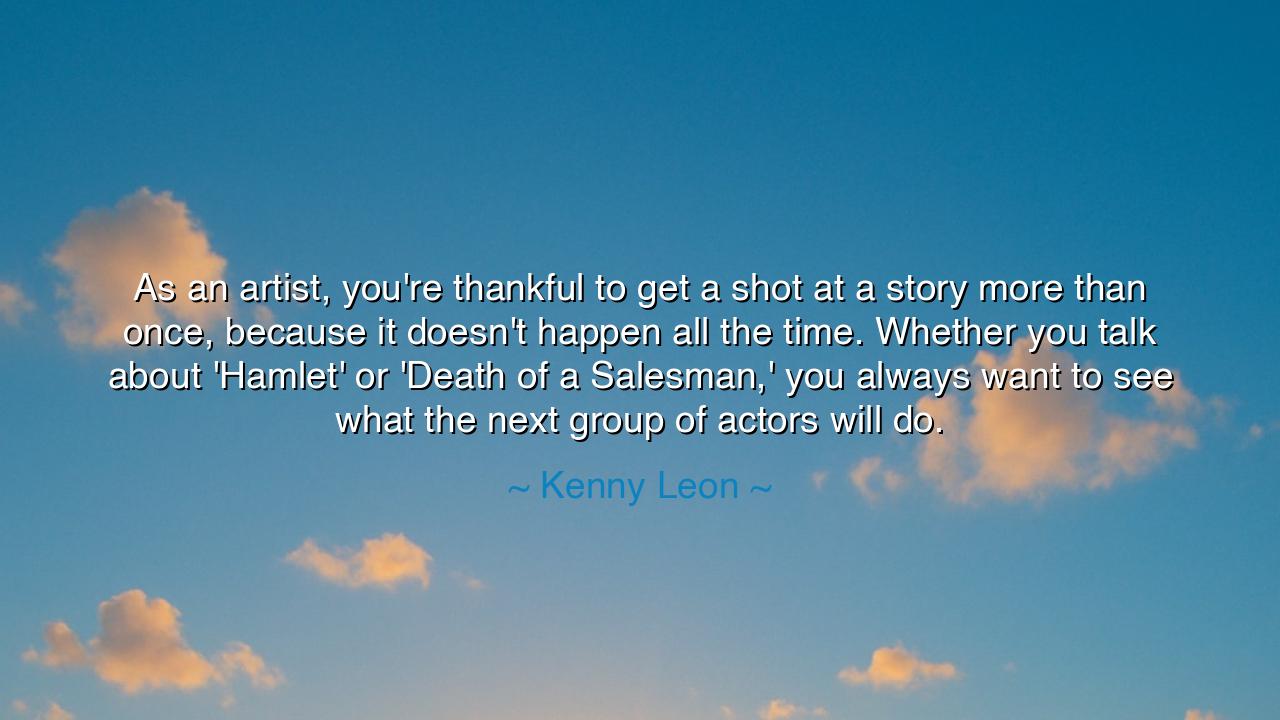
As an artist, you're thankful to get a shot at a story more than
As an artist, you're thankful to get a shot at a story more than once, because it doesn't happen all the time. Whether you talk about 'Hamlet' or 'Death of a Salesman,' you always want to see what the next group of actors will do.






In the words of Kenny Leon, master of the stage and guardian of stories, we hear the reverence of an artist for the ever-living spirit of drama: “As an artist, you’re thankful to get a shot at a story more than once, because it doesn’t happen all the time. Whether you talk about ‘Hamlet’ or ‘Death of a Salesman,’ you always want to see what the next group of actors will do.” These words are not spoken lightly, for they carry the ancient wisdom that no story is ever finished, and that every telling is a new birth.
To be thankful for a story more than once is to recognize that art is not bound to a single performance, nor sealed in the vessel of one actor’s voice. It is a living flame, passed from hand to hand, from age to age, each time burning in a new shape, yet still carrying the eternal spark. Leon speaks of Hamlet and Death of a Salesman not merely as plays, but as sacred texts of the theater—stories that, like the myths of Greece or the parables of old, live again each time they are told, reshaped by the souls who embody them.
This truth was known even to the ancients. The Iliad and the Odyssey were sung by countless bards across centuries. Each singer gave their own rhythm, their own emphasis, their own fire to the lines, and though Homer’s words endured, the spirit of the story was always renewed. So too do the actors of every generation become bards, carrying forward the essence of the tale, but letting it shine in a way that reflects their own time, their own hearts.
Leon also reveals the humility of the artist as servant to the story. For in his words, the story is greater than the actor, greater than the performance. The actor may change, the stage may alter, but the story endures. And in this endurance, the artist finds joy—not in claiming ownership, but in becoming one thread of a tapestry far greater than themselves. To be “thankful” is to rejoice in the chance to contribute, even if only for a moment, to the life of something eternal.
There is also here a teaching about legacy and renewal. No one performance can exhaust the depth of a great story. Hamlet has been performed for centuries, yet each new actor reveals something unseen, each new director brings forth a truth that had slept beneath the surface. In this way, art mirrors life itself: every generation must revisit the old struggles—of ambition, of family, of mortality—and interpret them anew. Thus the theater becomes a mirror not only of the past, but of the present and the future.
What lesson, then, must we draw from Leon’s words? It is this: do not think of your work, your story, your contribution as final. Others will come after you, and they too will breathe life into what you leave behind. Therefore, live not with the pride of permanence, but with the humility of participation. Be grateful for the chance to tell the story once, or twice, or many times—but rejoice even more that the story itself will outlive you, carried forward by those yet to come.
Practically, this means cultivating both gratitude and openness. If you are entrusted with a story—whether in art, in work, in family—give it all your heart. But also delight in the way others may carry it differently. Do not cling to your telling as the only truth; instead, marvel at the diversity of voices that reveal new colors in the same tale. Support the next generation, encourage their interpretations, and see in them not threat but continuation.
Thus, the wisdom of Kenny Leon endures: “You always want to see what the next group of actors will do.” For the artist, the gift is not only in performance, but in witnessing the unending rebirth of the story. And for us all, the teaching is clear: life itself is a story retold, each generation adding its verse. Be thankful for your chance to speak, but rejoice also in the voices yet to come, for together they weave the endless song of humanity.






AAdministratorAdministrator
Welcome, honored guests. Please leave a comment, we will respond soon